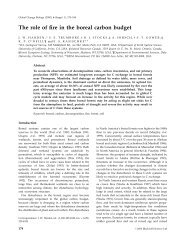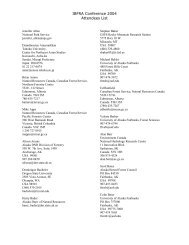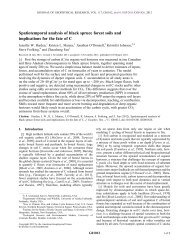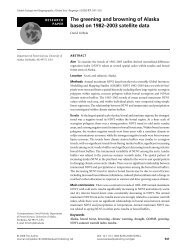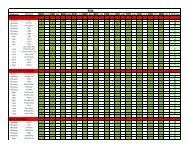Chapin, F.S., III, M.D. Robards, H.P. Huntington, J.F. Johnstone, S.F. ...
Chapin, F.S., III, M.D. Robards, H.P. Huntington, J.F. Johnstone, S.F. ...
Chapin, F.S., III, M.D. Robards, H.P. Huntington, J.F. Johnstone, S.F. ...
Create successful ePaper yourself
Turn your PDF publications into a flip-book with our unique Google optimized e-Paper software.
F. S. <strong>Chapin</strong> et al., Directional Changes in Ecological Communities<br />
02/26/2007 07:26 AM<br />
social-ecological hypotheses described above provide a basis for predicting when institutional feedbacks will<br />
be effective in constraining human impacts on ecological communities.<br />
We are only beginning to develop a predictive understanding of the feedbacks between social and<br />
ecological processes and therefore human impacts on the structure of ecological communities. The<br />
hypotheses that we present suggest a clear role for science in identifying and quantifying the temporal,<br />
spatial, and institutional disconnects between human actions and ecological consequences. These hypotheses<br />
also suggest a role for scientifically informed public education, particularly in moments of crisis, to develop<br />
policies that reduce the magnitude of these disconnects (Pitcher and Pauly 1998), in part through<br />
development of alternative policy scenarios (Millennium Ecosystem Assessment 2003).<br />
Conclusion<br />
In conclusion, we argue that the ecological community predictions that have guided the development of<br />
theoretical ecology continue to provide a fruitful framework for predicting the structure and composition of<br />
ecological communities, particularly under circumstances where strong negative feedbacks constrain changes<br />
in the slow variables that modulate long-term patterns of community structure. These community predictions<br />
are necessary but insufficient to predict the changes likely to occur in a directionally changing world. Our<br />
growing understanding of ecological thresholds and of social-ecological systems provides hope that a<br />
framework that incorporates some of these dynamics can improve our ability to predict future changes in<br />
ecological communities and social-ecological systems. Because of the large role that people play in<br />
modifying ecosystems and ecosystem services, it is particularly important to test and improve the socialecological<br />
hypotheses as a basis for shaping appropriate policies for long-term ecosystem resilience.<br />
Acknowledgments<br />
We thank M. Power and two anonymous reviewers for insightful comments and suggestions. This<br />
research was part of the Integrative Graduate Education and Research Training program in resilience and<br />
adaptation (National Science Foundation [NSF] grant DGE-0114423) and the Bonanza Creek Long-Term<br />
Ecological Research program (funded jointly by NSF grant DEB-0423442 and USDA Forest Service, Pacific<br />
Northwest Research Station grant PNW01-JV11261952-231), with additional funding from NSF grant OPP-<br />
0328282 for study of human-fire interactions.<br />
Literature Cited<br />
ACIA. 2005. Arctic climate impact assessment. Cambridge University Press, Cambridge. First citation<br />
in article<br />
Barber, V. A., G. P. Juday, and B. P. Finney. 2000. Reduced growth of Alaskan white spruce in the<br />
twentieth century from temperature-induced drought stress. Nature 405:668–673. First citation in<br />
article | PubMed | CrossRef<br />
Beisner, B. E., D. T. Haydon, and K. Cuddington. 2003. Alternative stable states in ecology. Frontiers<br />
in Ecology and the Environment 1:376–382. First citation in article<br />
file:///private/var/tmp/folders.501/TemporaryItems/com.apple.mail/compose/attach/<strong>Chapin</strong>2006AmNat.webarchive<br />
Page 15 of 21



